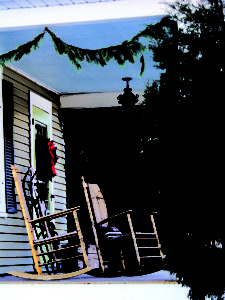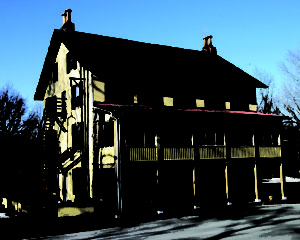Riegelsville
 By Kathryn Finegan Clark~
By Kathryn Finegan Clark~
Say what you will about the dull, nothing-ever-happens small town, but consider this: sometimes things do happen. Take a look at Riegelsville, the quintessential small town. The town is wrapped in its history; some think it is bound by it.
A decade ago lots of people thought the Delaware River town only nine miles south of Easton was stuck in its own time warp. But now, it’s come awake and is beginning to draw newcomers who are actually being accepted by the townspeople, who had tended to be clannish. In the last decade or so, they have moved closer to accepting newcomers seeking to build new lives in a small-town ambience, bringing new talents and enthusiasm to the community.
Bil Mitchell, a luthier, now builds exquisite world-class acoustic guitars in the Guitar Parlor on Durham Road while his wife, Sarah Dieterichs, repairs stringed instruments. Their business thrives.
The historic Riegelsville Inn, built in 1838 by Benjamin Riegel, now offers both gourmet and casual dining. The Bean Block at the corner of Delaware and Durham roads which housed a variety of small businesses in the 19th century has been handsomely restored. The ancient post office also has a new face.
Oxford Diabetics Co., has opened an office and call center on Durham Road, bringing new employment opportunities. The nearby Fig Tree Market & Catering has become a popular spot and the Riegelsville Tattoo Parlor is now installed on Easton Road.
Joe Coco, a college art professor and song-writing musician, moved into Riegelsville several years ago and has translated his love for the town with all its pleasures and quirks to a CD named “Small Wonders.”
Say what you will about the dull, nothing-ever-happens small town, but consider this: sometimes things do happen.
And then there’s the Rev. Jeffrey A. Wargo, pastor of St. John United Church of Christ and chaplain for Community Fire Co. No. 1, which not only protects the town, but also provides some of its social life. The pastor doesn’t like to be called a ghost hunter; nevertheless, he knows where they hide, and has written two books, “Ghosts in the ‘Ville” and “More Ghosts in the ‘Ville.” His stories record paranormal and other unexplained occurrences at more than 20 places in town. No surprise, in Riegelsville, with all that history bouncing off the walls.
 The history’s been stacking up since 1774, when a Williams Township blacksmith, Wendell Shank, bought riverside acreage that was part of the Durham Iron Works tract, built a log house, a barn and a blacksmith shop. He opened a new public road from the blast furnace in the village of Durham to the river and started a ferry service.
The history’s been stacking up since 1774, when a Williams Township blacksmith, Wendell Shank, bought riverside acreage that was part of the Durham Iron Works tract, built a log house, a barn and a blacksmith shop. He opened a new public road from the blast furnace in the village of Durham to the river and started a ferry service.
The place became known as Shank’s Ferry until one Benjamin Riegel, a Lower Saucon Township farmer, bought the property in 1806, taking over the ferry, erecting buildings, establishing the Riegel dynasty and changing the town’s name to Riegelsville.
His nephew, another Benjamin, a miller, later built a brick home on the property and subdivided the acreage, just before the 1832 construction of the Delaware Division Canal, an event that was to open the town to commerce. The canal and a bridge the Riegels built across the Delaware in 1838 to replace the ferry were key to the town’s growth. The original wooden covered bridge was swept away by a flood in 1903 and replaced with a steel wire bridge in 1904.
One hundred years later the townspeople marked the bridge’s centennial with a parade of antique cars and a community party. The suspension bridge, connecting the two Riegelsvilles, constructed by John A. Roebling & Sons Co., builder of the Brooklyn Bridge, is unique. Now on the National Register of Historic Places, it still carries traffic and remains a source of community pride.
The Riegel family, prolific and productive, developed the town and turned it into a manufacturing center. John Leidy Riegel, son of Benjamin the miller and the fifth child of the family’s fifth generation, created the considerable Riegel fortune.
An entrepreneurial manufacturer, Riegel established paper mills in a cluster of small towns along the Musconetcong River in New Jersey, providing jobs for generations on both sides of the Delaware. Married four times, each time to a woman a decade or more younger than his previous wife, he sired 13 children. An original shareholder and director of Bethlehem Steel, he was generous to the community.
He built the Riegelsville Academy, a private co-ed prep school in 1886, at the same time establishing the Riegelsville Public Library for use by students and the community. The academy operated until 1916. The building now houses the borough hall and the library, an enduring asset that occasionally has faced hard times and has always been rescued by community volunteers. Still situated in the handsome top level of the old academy building, it is now part of the Bucks County Public Library system.
The academy building and many other structures in town are listed on various historic registers. One of the most imposing is certainly Glacialdrift, the Victorian mansion on Easton Road, built in 1895 by Benjamin Franklin Fackenthal Jr., for his wife, Sarah Jane, a daughter of John Leidy Riegel. Legendary Americans Theodore Roosevelt and Henry Cabot Lodge Sr., were frequent guests of the Fackenthals who also chummed around with Thomas Edison and Henry Ford. Fackenthal was president of the Thomas Iron Co., in Easton, and later a genealogist and local historian.
The mansion, which now houses Villa Richard, a restaurant and bed-and-breakfast inn, is said to be the work of William Marsh Michler, an architect who designed many of the mansions on Easton’s College Hill. Those years surrounding the dawn of the 20th century marked the town’s heyday.
It was not just the love of high ground that prompted the rich to build lavish homes along Mansion Row on the tall western bank of the Delaware. The lower level of town has always been plagued by floods, most recently three in only 18 months during 2004-2006. But over the years, many people have picked up themselves and their battered possessions and somehow survived, not quite able to leave their Riegelsville homes, even though they know the river will flood again … and again.
Kathryn Finegan Clark is a National Press Club Award winner who has been writing “Because You Live Here” and other departments for Lehigh Valley Marketplace for several years.




